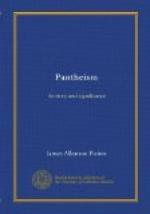Here we are clearly taught that the “self,” or inmost reality of every person and thing is the Eternal One, or Brahma, or God.
[Sidenote: Illustration from the Bhagavad Gita.]
The same doctrine is taught in a more advanced form by the poem called the “Bhagavad Gita,” the date of which is probably more than a thousand years later than that of the Upanishad just quoted. In this poem, Krishna, incarnate for the nonce as Arjuna’s charioteer, reveals for a special purpose his identity with Brahma, the Eternal All; and Arjuna, when sufficiently instructed adores him thus:—
“O infinite Lord of Gods! the world’s
abode,
Thou undivided art, o’er all
supreme.
Thou art the first of Gods, the
ancient Sire,
The treasure-house supreme of all
the worlds.
The Knowing and the Known, the highest
seat.
From Thee the All has sprung, O
boundless Form!
Varuna, Vayu, Agni, Yama thou,[6]
The Moon; the Sire and Grandsire
too of men.
The Infinite in power, of boundless
force,
The All thou dost embrace; the Thou
art All."[7]
[Sidenote: Omission of Buddhism.]
These illustrations must suffice for Indian Pantheism. Because, with Buddhism we have nothing to do. For, according to its ablest European exponent (Professor T.W. Rhys Davids), that system of religion simply ignored the conception of an All in All. And this not at all on philosophical grounds, but because its aims were entirely practical. For the aim of its founder was to show men how by a virtuous life, or lives, they might at last attain annihilation—or, at any rate, the extinction of the individual self, the apparent separateness of which was, in his view, the source of all misery. And if he could teach his followers to attain that salvation, he was entirely indifferent as to the opinions they might hold about the ultimate nature of the world, provided only that they did not fall into any heresy which proclaimed an immortal soul.[8]
[Sidenote: Persian Religions, not strictly Pantheistic.]
[Sidenote: A World Drama or Process is a Human, not a Divine Aspect of Things.]
The accounts given to us by the best authorities on Zoroaster and Parseeism scarcely justify us in thinking the religion of the Zendavesta to be Pantheistic in our sense of the term. For though it would appear that Ormuzd (or Ahuramazda), the God of light and goodness, originated in, or was born from and one with a nameless impersonal Unity, such as may answer to Herbert Spencer’s “Unknowable,” it cannot be accurately said that, according to the Persian view of the world, there is nothing but God. For, to say nothing of the apparently independent existence of the principle of darkness and evil called Ahriman, the relation of the Amshaspands, or supreme spirits, and of the Izeds, or secondary spirits, as well as of the Fereurs, or divine ideas to the impersonal Unity, seems to be




